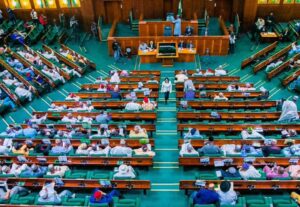Over-Bloated Payroll: Reps Task FG on Workers’ Forensic Audit
 The House of Representatives has asked the Federal Government, through the Office of the Secretary to the Government of the Federation, to carry out forensic audit of its staff to address the problem of ghost workers, with a view to saving money and reducing increasing wage bill.
The House of Representatives has asked the Federal Government, through the Office of the Secretary to the Government of the Federation, to carry out forensic audit of its staff to address the problem of ghost workers, with a view to saving money and reducing increasing wage bill.
It also urged the government to embark on cost-cutting measures to reduce other non-debt recurrent expenditures and mandated the Committee on Legislative Compliance to ensure implementation.
This followed the adoption of a motion on ‘Need to Investigate the Nation’s Galloping Non-Debt Recurrent Expenditure’, moved by Ademorin Kuye from Lagos, at plenary, yesterday.
Moving the motion, Kuye noted that the federal government personnel expenses, pensions and other non-debt recurrent expenditures increased by 241 per cent in 13 years from N2.4trillion in 2011 to N8,27trillion in 2023.
He also noted that the total non-debt expenditure from 2011 to 2023 was N51.97trillion, while N42.24trillion expended from 2015 till date represented 81.8 per cent of the total expenditures of the period under review.
According to him, the country’s revenue within the period received massive hits from debt servicing obligations.
Consequently, he said the government had little or nothing left for the recurrent expenditures and had resorted to borrowing.
“The debt servicing obligations gulped 97 per cent of the total revenue of the N3.42 trillion generated in 2011, Nigeria expended N3.34 trillion on debt servicing, meaning all federal government’s salaries, overhead and capital expenditure was financed with loans and Central Bank of Nigerian’s support.
“The country’s revenues of N3.42trillion in 2020, N4.39trillion in 2021 and N7trillion in 2022 could hardly fund the wage bill of N5.7trillion, N5.76trillion and N7.1 trillion in 2020, 2021 and 2022 respectively,” the lawmaker argued.
He expressed worry the federal government’s wage bill, pension obligations and other non-debt recurrent expenditures continued to grow significantly, despite the marginal increases in revenues and apparent increases in debt servicing pressure;
Kuye lamented that the sharp difference in the wage bill from N2.4 trillion in 2011 to N8.7 trillion in 2023 in a country of 113 million people living in multidimensional poverty was alarming and unjustifiable.
 Society Gazette Society Gazette News
Society Gazette Society Gazette News



